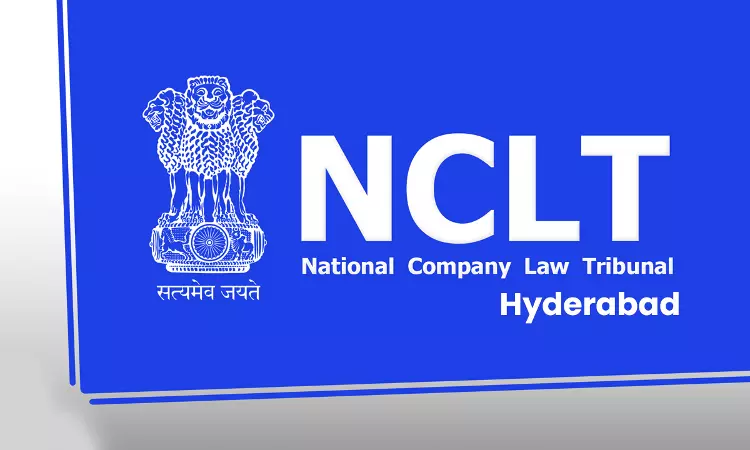Equity Investment Made Through Commercial MoU Doesn't Qualify As Operational Debt: NCLT Hyderabad
Mohd.Rehan Ali
19 Sept 2025 3:45 PM IST
The National Company Law Tribunal, Hyderabad Bench, comprising Mr. Rajee Bhardwaj (Member-Judicial) and Mr. Sanjay Puri (Member-Technical), has held that an equity investment with conditional repayment made through a commercial memorandum of understanding (MoU) doesn't qualify as operational debt. The present application was filed by the operational creditor u/s 9 read with rule 6 of...
The National Company Law Tribunal, Hyderabad Bench, comprising Mr. Rajee Bhardwaj (Member-Judicial) and Mr. Sanjay Puri (Member-Technical), has held that an equity investment with conditional repayment made through a commercial memorandum of understanding (MoU) doesn't qualify as operational debt.
The present application was filed by the operational creditor u/s 9 read with rule 6 of the IBC, seeking initiation of CIRP of the corporate debtor, alleging default of Rs. 2.75 Cr.
An MoU was signed between the applicant and the respondent, wherein the applicant agreed to invest in the corporate debtor in consideration of shares as security. In furtherance of the MoU, the applicant invested Rs. 1 crore, for which twenty lakh equity shares of Rs. 5 each were allotted.
When the default occurred, the applicant sold its shares and recovered an amount of Rs. 57.29 lakhs, and as per the MoU, the respondent became liable to repay the shortfall along with interest. Thereafter, on 30.06.2023, a second MoU was executed wherein the respondent agreed to pay the due amount of Rs. 2.75 Cr. On the respondent's failure to repay the same, the applicant issued the demand notice.
The respondent argued that the husband of the applicant has already filed a claim as a financial creditor, and now, on the same transaction, the present application has been filed as an operational creditor.
It argued that the application is not maintainable, as it has been filed seeking recovery of losses suffered in the sale of shares, and such claims do not qualify as the 'operational debt' u/s 5(21) of the IBC. Relying on the ruling of Pioneer Urban Land and Infrastructure Ltd. & Anr. v. Union of India & Ors., (2019) 8 SCC 416, the applicant contended that the IBC cannot be used for recovery of disputed dues and for the cases of civil and contractual disputes.
The respondent also contended that once the investment was made and the shares were allotted pursuant to the MoU, there existed no liability. Also, equity is not a loan and doesn't come under the meaning of S. 5(8) or 5(21).
It further submitted that the loss incurred in the sale of the share is an investment risk, and it cannot be recovered as the operational debt.
Observations of the Adjudicating Authority
The NCLT observed that it is not disputed between the parties that the applicant has invested an amount of Rs. 1 Cr in pursuance of the MoU.
The bench observed that the reading of the MoU suggests that the investment was made towards the acquisition of equity shares and not towards any supply of goods or services. And the plain reading of section 5(21) provides that the claim arising out of equity investment or share subscription doesn't qualify as the operational debt.
Further, the bench observed that the promise of a refund in case of non-performance doesn't alter the nature of the debt, and the commercial MoU lacks the character of the operational relationship.
The bench further discussed several rulings that were passed relying upon the Anuj Jain, IRP v. Axis Bank Ltd., (2020) 8 SCC 401, and held that the debt should not be merely a commercial investment with conditional repayment. Therefore, it falls outside the ambit of section 5(21).
Also, the second MoU constituted the novation of the original contract u/s 62 of the Contract Act. It replaced the prior obligation, and any breach thereof would not automatically lead to a valid operational debt under IBC.
Lastly, the bench observed that the IBC proceedings cannot be used as a substitute for debt recovery, and the applicant should resolve it through civil courts or arbitration forums.
Accordingly, the appeal was dismissed due to lack of merit.
Case Name: Neeta Zanvar v. Filatex Fashions Ltd
Case No.: C.P. (IB) No. 30/9/HDB/2024
Bench: Shri Rajeev Bhardwaj (Judicial Member) and Shri Sanjay Puri (Technical Member)
Order Date: 05.08.2025



